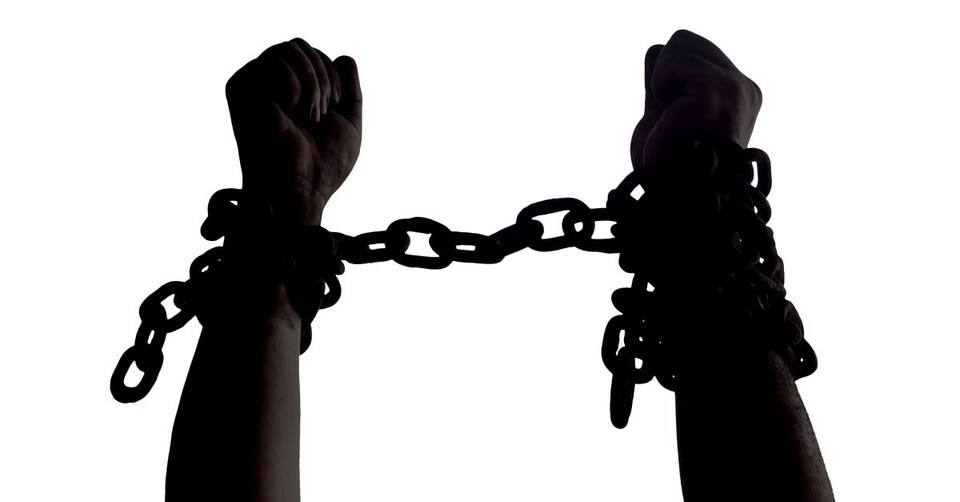Does the Bible Contradict Itself Concerning Slavery?

Whenever the term slavery is mentioned, most minds travel back to the Civil War period of the United States because of the publicized history of this era. However, slavery has existed since the beginning of time. The Emancipation Proclamation, signed by President Abraham Lincoln, ended the practice of slavery in the United States, but the enslavement of human beings didn’t go away.
Slavery has existed since the beginning of time. Buying and selling people has always been a profitable business.
Since its inception in 2007, the National Human Trafficking Hotline has handled almost 400,000 contacts through emails, online messaging, phone calls, and text messages. This is not how many people have been forced into some type of human bondage. These are only the statistics of how many contacts were made.
This worldwide billion-dollar industry thrives because it is so lucrative. Multiple agencies and organizations continue to fight this crime against humanity, but the evil continues to spread.
According to the International Labor Organization, approximately 50 million people are in some type of forced slavery today. This includes labor and forced marriage.
What does God think about this treatment of people? Some Scriptures have been used over time to support the institution of slavery.
But Does the Bible Really Condone Slavery?
Because the Lord values humanity, He instituted strict punishment against anyone kidnapping and selling people.
Anyone who kidnaps someone is to be put to death, whether the victim has been sold or is still in the kidnapper’s possession. (Exodus 21:16 NIV)
The Bible was written in the Hebrew and Greek languages. We must realize that translations are not word-for-word interpretations. It can take an entire phrase sometimes to translate the meaning of one word.
The Hebrew term “eved,” or “ebed,” is used multiple times in the Old Testament and has been translated as slave or servant in different areas dependent upon its intent in usage.
Servants of God
Moses, my servant (ebed) is dead. (Joshua 1:2)
Here, ebed was translated as a servant, indicating Moses served God and did so with a willing heart.
Be good to your servant while I live, that I may obey your word. (Psalm 119:17)
In Psalm 119:17 servant also displays a submitted attitude toward God with willing worship, not enforced bondage.
In Genesis 19:2, Lot addresses the angels who came to remove him from Sodom and Gomorrah. “My lords”, he said, “please turn aside to your servant’s (ebed) house.”
He tells them to come into his house, calling himself their servant. Lot is not a slave to these angels, but he uses the term servant to indicate he wants to show hospitality to them as well as protect them from the immoral practices the men of the city want to do. Lot displayed humble subservience to these angels to indicate they were greater than he was.
Servants as Payment of a Debt
If any of your fellow Israelites become poor and sell themselves to you, do not make them work as slaves. They are to be treated as hired workers or temporary residents among you: they are to work for you until the Year of Jubilee. Then they and their children are to be released, and they will go back to their own clans and to the property of their ancestors. Because the Israelites are my servants, whom I brought out of Egypt, they must not be sold as slaves. Do not rule over them ruthlessly, but fear your God. (Leviticus 25:39-43)
Israel was in the process of becoming a nation. They didn’t have financial institutions to create loans like we have today. God made provision for those who incurred debts to pay back what they borrowed by working for those they owed money to. Conditions were made to release them after their debt was paid. They were not to be forced into hard labor and they were to be released from their debt at the Year of Jubilee. This would be a debtor/creditor type relationship.
When we pay off loans today, we receive notes stamped “paid in full.” The paid-in-full stamp for the debtors of Israel was to release their indentured servants back into society with no strings attached.
They were also not to go away without resources. Deuteronomy 15:13-15 commands that they don’t leave empty-handed but be supplied with whatever they need to live on their own.
Slaves as Punishment for Crimes
Anyone who steals must certainly make restitution, but if they have nothing, they must be sold to pay for their theft. (Exodus 22:2-4)
The new nation of Israel also did not have a prison system. God made provision for the leaders to have a way to punish criminals.

Photo Credit: ©Getty Images/cineuno
Slaves from Foreign Nations
Here we get into some of the sticky discussions that strive to condone slavery.
Your male and female slaves are to come from the nations around you; from them you may buy slaves. You may also buy some of the temporary residents living among you and members of their clans born in your country, and they will become your property. (Leviticus 25:44)
Why is there a distinction here between Israelites and foreign slaves?
One reason could be because of the behavior of the people from the nations surrounding Israel. Human sacrifice was a common practice in most of the areas. That is the reason God told the Hebrews to conquer these nations and even kill most of the residents. He needed to stop the spread of these heinous behaviors.
Those who were not killed were made into bondslaves to prevent them from continuing in these evil displays of devil worship. They were enslaved as punishment for desecrating the land.
In 1 Kings 9:21 the word abad was translated in the King James Version as bondservice.
And all the people that were left of the Amorites, Hittites, Perizzites, Hivites, and Jebusites, which were not of the children of Israel, their children that were left after them in the land, whom the children of Israel did not destroy, upon those did Solomon levy a tribute of bond service unto this day. The NIV uses the words slave labor.
King David also made the Edomites he conquered subject to him (2 Samuel 8:14).
Israelites who were made into slaves as punishment for crimes were eventually released once their sentence was up. The foreigners were never released due to the intensity of their crimes, but they were still treated humanely.
God continually reminded the Israelites to remember he had redeemed them from slavery in Egypt. They were never to treat their servants or slaves in the rigorous way the Egyptians treated them.
Remember that you were slaves in Egypt and that the Lord your God brought you out of there with a mighty hand and an outstretched arm. Therefore the Lord your God has commanded you to observe the Sabbath Day. (Deuteronomy 5:15)
Punishment for Harsh Treatment of Slaves
Anyone who beats their male or female slave with a rod must be punished if the slave dies as a direct result, but they are not to be punished if the slave recovers after a day or two, since the slave is their property. (Exodus 21:20-21)
According to Adam Clarke’s commentary on this verse, he says:
“If the slave who had been beaten by his master died under his hand, the master was punished with death (Genesis 9:5). But if he survived the beating a day or two the master was not punished, because it might be presumed that the man died through some other cause. And all penal laws should be construed as favorably as possible to the accused.”
Exodus 21:26–27 also stipulates compensation to a slave who is injured by an owner.
God continued to remind the Israelites of the value of human life. Capital punishment was directed against anyone taking another person’s life whether slave or free.
Slavery in the New Testament
Many New Testament writers implied they were servants of Christ, meaning they had willingly dedicated themselves to following His lifestyle (Romans 1:1, 2 Peter 1:1). They were not forced into obeying God but used this terminology to indicate Christ was their Master.
In Philemon 1:15-16, Paul writes to Philemon, the slave owner, requesting that he receive a runaway slave back with compassion instead of punishment.
We need to also see here that this is a Greek man not under the law of Moses. But Paul admonishes him as a Christian brother to act favorably toward his departed servant according to the biblical teaching of Christ’s love.
Paul also offered to pay any debts incurred by Onesimus, the slave.
RELATED PODCAST:
Servants of Christ
Jesus Christ, who was and is God, was willing to lay aside the benefits of deity for a time to make himself a servant to us. He showed His disciples what true servanthood was by washing their feet. His lessons teach us that being a servant is not necessarily physical labor (although it can be), but an attitude of submission to do what is best for the other person (Philippians 2:3).
Christ displayed the ultimate act of humility by submitting to the cross.
Who, being in very nature God, did not consider equality with God something to be used to his own advantage; rather, he made himself nothing, by taking the very nature of a servant, being made in human likeness. And being found in appearance as a man, he humbled himself by becoming obedient to death—even death on a cross! (Philippians 2:6-8)
As believers in the Lord, we, too, should consider ourselves servants of Christ. We can have no greater Master than the Lord of heaven and earth.
How do you personally wrestle with biblical passages on slavery? Join the conversation on Crosswalk FORUMS!
Photo Credit: ©GettyImages/Boonyachoat

Her book, Redemption, the Heartbeat of Christmas: What the Birth of Christ Means to the World, was released in October 2025. She loves coffee, a good book, and gardening, which would be more fun if not for the weeds. Barbara and her husband enjoy life with two sons, one daughter-in-love, and an energetic granddaughter who keeps these retired people on their toes.
She writes about living in our identity in Christ at https://barbaralatta.blogspot.com/. You can follow Barbara on Facebook: Barbara Latta, author; X @barbaralatta; and Instagram blatta2.
Originally published March 14, 2024.




